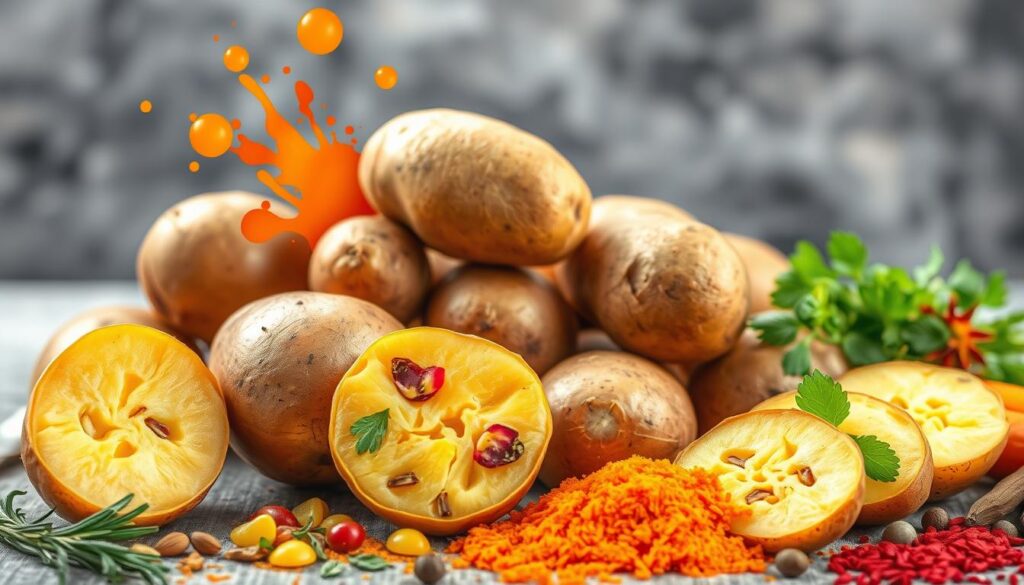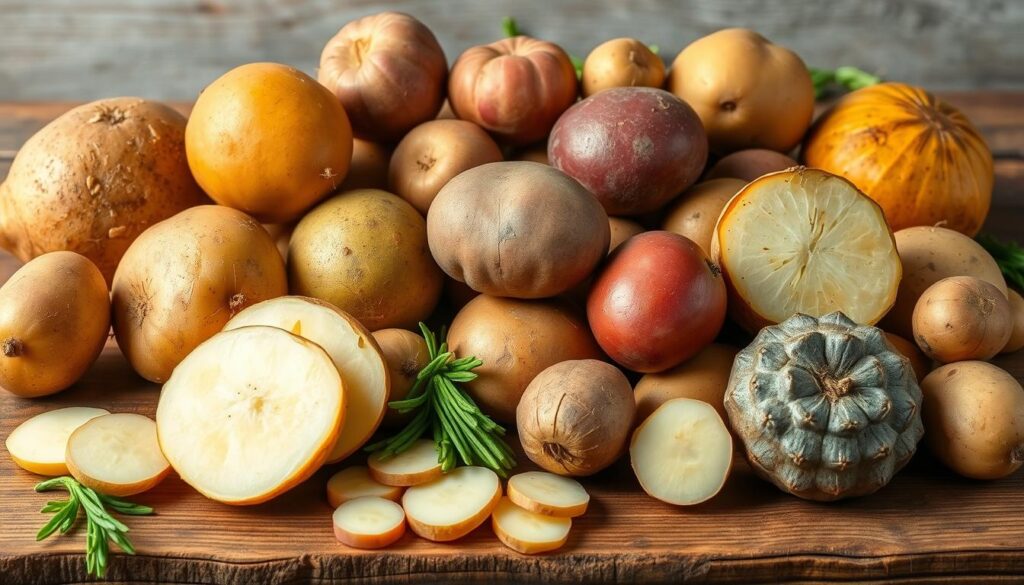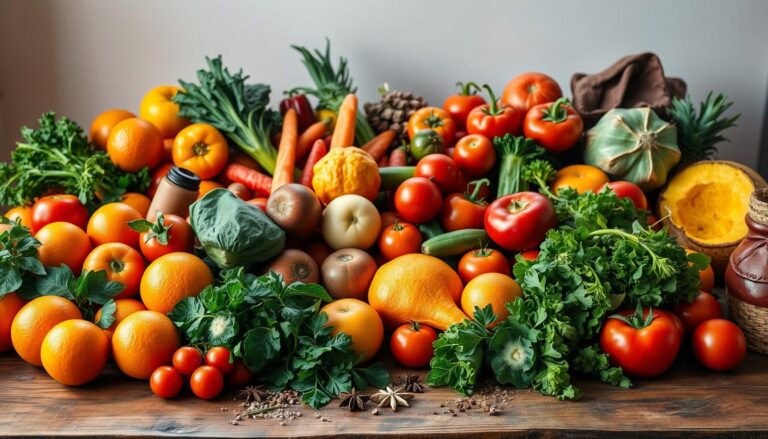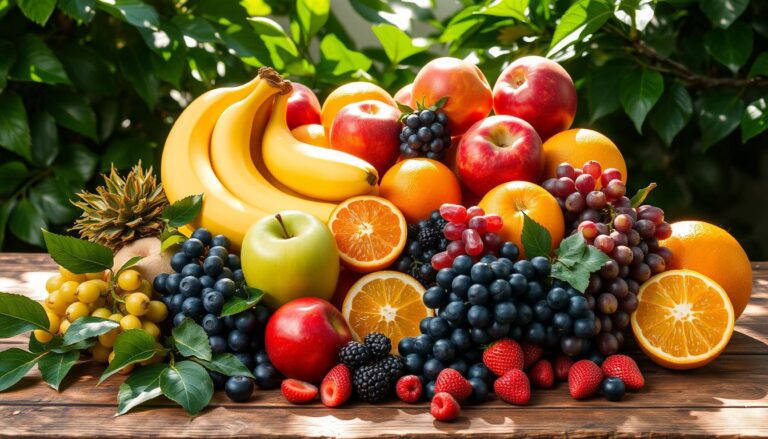Potatoes are a big part of American diets, with people eating about 49.4 pounds of them in 2019. But are they really good for us, or are they just empty calories? Let’s explore the surprising health perks of eating potatoes.
Key Takeaways
- Potatoes are full of vitamins, minerals, and fiber, making them a healthy choice.
- They offer great value for their price, making them affordable for many.
- Resistant starch in potatoes can help control blood sugar and support gut health.
- Choosing to bake or boil potatoes can make them even healthier.
- While safe for most, green potatoes and high glycoalkaloids levels need caution.
Potato Varieties and Their Uses
Potatoes come in many shapes, sizes, and flavors. Each type is perfect for different dishes. Knowing about different potatoes can help you pick the best one for your meal.
Starchy Potatoes
Starchy potatoes, like Russet, have lots of starch and less moisture. They’re great for baking, frying, and mashing. Their strong texture works well in these cooking methods.
Starchy potatoes are perfect for fluffy mashed potatoes, crispy fries, and light baked potatoes.
Waxy Potatoes
Waxy potatoes, like red bliss, have less starch and more moisture. They’re best for boiling, roasting, and salads. Their creamy texture holds up well in these dishes.
Waxy potatoes are ideal for potato salad, roasted potatoes, and boiled new potatoes.
All-Purpose Potatoes
All-purpose potatoes, like Yukon Gold, have a balanced starch and moisture level. They work for baking, frying, boiling, and roasting. They’re versatile and can handle many cooking methods.
All-purpose potatoes are great for home cooks who want a potato that can do it all.
| Potato Variety | Starch Content | Moisture Content | Best Cooking Methods |
|---|---|---|---|
| Russet | High | Low | Baking, Frying, Mashing |
| Red Bliss | Low | High | Boiling, Roasting, Salads |
| Yukon Gold | Medium | Medium | Baking, Frying, Boiling, Roasting |
Choosing the right potato variety can make your dishes better. It ensures a tasty and satisfying meal.

Nutritional Value of Potatoes
Potatoes are full of good stuff like vitamins, minerals, and fiber. A medium-sized baked potato with skin on has lots of vitamin C, vitamin B6, potassium, and manganese. One potato can give you up to 27mg of vitamin C, 620mg of potassium, and 0.2mg of vitamin B6.
The skin of a potato is where most of its fiber and nutrients are found. A small skin-on potato has about 2 grams of fiber. This is great for your digestive health and overall well-being.
Vitamins and Minerals
Potatoes are full of important vitamins and minerals. They also have lots of:
- Vitamin B6
- Manganese
- Phosphorus
- Niacin
- Pantothenic acid
- Folate
Fiber Content
Potatoes are a great source of dietary fiber. A medium-sized potato has about 2 grams of fiber. This is as much as many whole grain products, making potatoes good for your digestive health.
The resistant starch in potatoes can be up to 13% after cooking and cooling. This helps with colon health and glucose metabolism.
“Potatoes offer essential nutrients such as Vitamin C, Vitamin B6, potassium, and iron per 100g of raw potato.”
Antioxidant Properties of Potatoes
Potatoes are more than just a versatile starch. They are also a rich source of antioxidants. These compounds, like flavonoids and carotenoids, help fight harmful free radicals. They can lower the risk of heart disease, diabetes, and some cancers.
Colored potatoes, like purple ones, have more antioxidants than white potatoes. This makes them great for fighting oxidative stress and boosting health.
| Potato Variety | Antioxidant Content | Health Benefits |
|---|---|---|
| Purple Potatoes | High in anthocyanins, a type of flavonoid with powerful antioxidant properties | May help prevent heart disease, cancer, and support brain health |
| Yellow Potatoes | Rich in carotenoids, including lutein and zeaxanthin, which promote eye health | Can help reduce the risk of age-related macular degeneration and cataracts |
| Red Potatoes | Contain phenolic acids, like chlorogenic acid, which exhibit anti-inflammatory and anti-cancer properties | May help lower the risk of chronic diseases and support a healthy immune system |
The vibrant colors of these potatoes show their high antioxidant content. Eating different types of potatoes can give you a variety of health benefits. This way, you get the most from these potato antioxidants.
“Potatoes are often overlooked as a source of antioxidants, but their diverse phytochemical profile makes them a valuable addition to a healthy, balanced diet.” – Adrienne Posner, UC Davis Health dietetic intern

The potato health benefits go beyond fighting diseases. Adding potatoes to your meals can bring many advantages. They are versatile and packed with nutrients.
Blood Sugar Control with Resistant Starch
Potatoes are more than just a versatile carbohydrate source. They contain a unique type of starch called resistant starch. This starch is not fully broken down and absorbed by the body. Instead, it reaches the large intestine, where it becomes a valuable nutrient source for beneficial gut bacteria.
Studies have linked the consumption of resistant starch from potatoes to improved insulin sensitivity. They also show reduced blood sugar spikes. In fact, research has shown a 33-50% improvement in insulin sensitivity after consuming 15-30 grams of resistant starch per day for just four weeks.
The way you prepare and store potatoes can also impact their resistant starch content. Cooling boiled potatoes in the refrigerator overnight can significantly increase their resistant starch levels. This provides even greater benefits for blood sugar regulation.
| Benefit | Research Findings |
|---|---|
| Improved Insulin Sensitivity | 33-50% improvement after consuming 15-30 grams of resistant starch per day for 4 weeks |
| Reduced Blood Sugar Spikes | Resistant starch has a “second meal effect”, lowering blood sugar levels after subsequent meals |
| Potential Weight Management | Resistant starch may increase feelings of fullness and reduce appetite, leading to lower calorie intake |
By harnessing the power of potato resistant starch, you can enjoy the benefits of improved blood sugar control. This can support your overall health and wellness. Integrating resistant starch into your diet can be a simple and effective way to manage your potato blood sugar levels. It can also help take charge of your potato diabetes risk.

Digestive Health Benefits of Potatoes
Potatoes are more than just a versatile food. They also boost your digestive health thanks to their resistant starch. This starch feeds the good bacteria in your gut.
Role of Resistant Starch
The resistant starch in potatoes gets broken down by gut bacteria into butyrate. Butyrate is great for the cells lining your colon. It reduces inflammation, strengthens your colon, and lowers cancer risk. This makes potatoes a key player in a healthy gut.
Butyrate and Gut Health
Potato butyrate is also good for your gut. It has been shown to:
- Reduce inflammation in the colon
- Strengthen the gut barrier
- Lower the risk of colorectal cancer
- Improve the balance of gut bacteria
Eating potatoes can help your gut thrive. A healthy gut is key to good digestion and overall health.

Are potatoes healthy for you?
Potatoes are a great choice for your diet. They are full of nutrients and can be very healthy if cooked right. They have vitamins, minerals, antioxidants, and fiber, which are good for you.
A medium-sized raw Russet potato with skin has 168 calories, 38.6g of carbs, 2.77g of fiber, and 4.56g of protein. They are also packed with potassium, vitamin C, and vitamin B6. These nutrients are important for your health.
Potatoes also have antioxidants like carotenoids, patatin, and phenolic compounds. These help fight off harmful free radicals and lower the risk of chronic diseases.
| Nutrient | Amount per Medium Russet Potato (with skin) | % Daily Value |
|---|---|---|
| Calories | 168 | – |
| Carbohydrates | 38.6g | 13% |
| Fiber | 3.8g | 15% |
| Protein | 4.56g | 9% |
| Potassium | 738mg | 21% |
| Vitamin C | 21.9mg | 37% |
| Vitamin B6 | 0.31mg | 18% |
Potatoes also have resistant starch, which helps control blood sugar and improves digestion. Cooking and cooling potatoes increases their resistant starch, making them even better for you.
While some potato dishes are high in fat and calories, potatoes themselves are not bad. Cooking them by baking, roasting, or boiling makes them a healthy and tasty part of a balanced diet.

In conclusion, potatoes are a healthy food that can be part of a balanced diet. Knowing the potato health benefits and adding them to your meals can be very rewarding. They are a nutritious potato with many positive effects on your body.
Gluten-Free and Celiac-Friendly
Potatoes are a gluten-free powerhouse, making them great for those on a gluten-free diet. They are safe and nutritious for people with celiac disease or gluten sensitivity. This makes potatoes a perfect choice for a gluten-free meal.
Potato flour is often used in gluten-free recipes like bread and pasta. With so many potato varieties out there, finding a gluten-free option is easy. This means you can satisfy any craving without gluten.
But, it’s important to watch out for hidden gluten in potato dishes. Some dishes, like gravy and potato bread, might have gluten. Always check that all ingredients in your potato meals are gluten-free.
For those with celiac disease or gluten intolerance, potatoes are a blessing. By choosing the right ingredients and cooking methods, they can enjoy potatoes safely. This keeps their diet healthy and balanced.
“Potatoes are a naturally gluten-free food that can be a safe and nutritious option for those following a gluten-free lifestyle.”
Satiety and Weight Management
Potatoes are great for managing weight and feeling full. They are among the most filling foods, thanks to their fiber and resistant starch. These help release hormones that make you feel full.
Eating potatoes can help control your appetite and lower calorie intake. This might lead to weight loss over time. The potato diet, which cuts calories, can speed up weight loss when you’re active.
Potatoes are low in calories but high in fiber and water. This makes you feel full. They also have vitamins like C, potassium, and B6. These nutrients help your health and reduce bloating.
| Nutrient | Amount in a Medium Potato |
|---|---|
| Calories | 150 |
| Fiber | 4 grams |
| Vitamin C | 45% of the Daily Value |
| Potassium | 620 milligrams |
| Vitamin B6 | 15% of the Daily Value |
Using potatoes instead of rice or pasta can help with weight management. The resistant starch in potatoes also feeds good gut bacteria. This boosts metabolism and aids in weight loss.
It’s key to watch your portion sizes and choose healthy ways to cook potatoes. Boiling or steaming is best. Also, pick nutritious toppings for potatoes satiety and weight control. Potatoes are a nutritious and filling food for a healthy diet.
Preparation Methods for Healthy Potato Dishes
How you prepare potatoes can greatly affect their health benefits. It’s important to pick the right cooking methods to get the most out of this versatile veggie.
Baking and Roasting
Baking and roasting potatoes, especially with the skin on, are great for keeping nutrients. These methods let the potatoes’ natural flavors come through without needing lots of extra fats or oils.
Boiling and Steaming
Boiling and steaming potatoes are also good for you. They help keep the potatoes’ vitamins, minerals, and fiber, making them a healthy choice.
Frying potatoes in oil, however, adds a lot of calories and fat. This makes them less healthy. By choosing better cooking methods and using less fat, you can make potatoes more nutritious.
| Preparation Method | Calories (per serving) | Total Fat (g per serving) | Protein (g per serving) | Carbohydrates (g per serving) | Fiber (g per serving) | Sugar (g per serving) | Sodium (mg per serving) | Dietary Tags |
|---|---|---|---|---|---|---|---|---|
| Baked Potato | 125 | 5 | 3 | 20 | 2.6 | 0 | 172 | Gluten-free, Heart-Healthy |
| Roasted Potatoes | 200 | 10 | 4 | 25 | 4 | 2 | 260 | Anti-Inflammatory, Dairy-free |
| Boiled Potatoes | 151 | 7 | 3 | 22 | 3.4 | 1 | 216 | Gluten-free, Soy-free |
| Steamed Potatoes | 160 | 8 | 4 | 24 | 3.8 | 1 | 232 | Gluten-free, Tree Nut-free |
Knowing how different preparation methods affect potatoes’ nutrition helps you make better choices. This way, you can enjoy healthy and tasty potato dishes.
Potential Risks and Precautions
Potatoes are usually good for you, but there are some risks. One big concern is green potatoes and the toxins they contain.
Green Potatoes and Glycoalkaloids
When potatoes get light, they can turn green. This green color means they have toxic compounds called glycoalkaloids. These can be dangerous if you eat too much.
- Eating green potatoes can cause vomiting, stomach pain, and brain problems, especially in kids.
- To stay safe, don’t eat green potatoes. Remove any green parts or sprouts before cooking.
Some research also shows that eating potatoes before surgery can affect anesthesia. This is something to think about if you’re having surgery.
Even though potatoes are mostly healthy, it’s important to know about these risks. Being careful about green potatoes and toxins lets you enjoy potatoes safely.
Conclusion
Potatoes are a versatile and nutritious vegetable. They can be a healthy part of your diet when cooked right. They offer important vitamins, minerals, fiber, and antioxidants.
These nutrients help control blood sugar, improve digestion, and may lower disease risk. While some potato dishes are high in fat and calories, potatoes themselves can be enjoyed as part of a healthy lifestyle.
Knowing the different potato varieties and using healthier cooking methods boosts their nutritional value. Potatoes are a cost-effective source of essential nutrients. They are great for kids and teens.
With their versatility, nutrient profile, and health benefits, potatoes are key to a balanced diet. They can be a valuable part of a potato health benefits-conscious diet.
In summary, potatoes are a potato nutrition powerhouse. When eaten in moderation and as part of a healthy diet, they are excellent for well-being.





